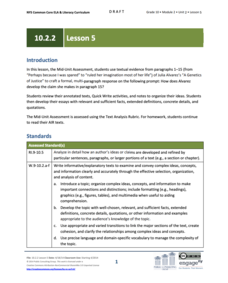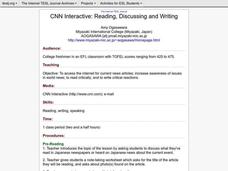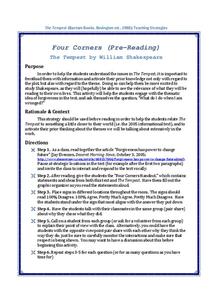iCivics
Step 3: Become an Expert
Have you ever been called an expert before? Pupils analyze how to break down sources of information using group work and individual skills. They begin to understand the tools of becoming an expert on a topic by using subtopics and...
New York State Education Department
English Language Arts Examination: June 2014
Should companies track consumers' shopping preferences without their permission? Using the resource, scholars write source-based argumentative essays to answer the question. They also answer reading comprehension questions based on an...
College Board
1999 AP® English Language and Composition Free-Response Questions
A released Advanced Placed exam provides scholars with an opportunity to practice their English language and composition skills. After reading two passages about Florida's Okefenokee Swamp, they write essays analyzing how the distinctive...
National Endowment for the Humanities
Toni Morrison's Beloved: For Sixty Million and More
Complex, disturbing, and challenging, Beloved is the focus of a lesson plan that provides three activities to guide a close reading of Toni Morrison's novel. Readers create chapter titles based on key plot elements or themes,...
EngageNY
Grade 9 ELA Module 1, Unit 2, Lesson 2
Class members continue their analysis of Letters to a Young Poet, paying particular attention to how Rilke uses metaphor to develop his ideas about the source of inspiration.
EngageNY
Grade 10 ELA Module 2: Unit 2, Lesson 5
How do learners use textual evidence from a close reading to write a well-developed essay? Scholars try it by completing a mid-unit assessment based on their analysis of the first 15 paragraphs from "A Genetics of Justice" by Julia...
National Endowment for the Humanities
Narrative Voice in Moby Dick
Call him a reliable narrator! Ishmael is the focus of a lesson plan that asks readers to analyze the complex character of Herman Melville's narrator as he is introduced in the first chapter of Moby Dick.
Penguin Books
A Teacher's Guide to the Signet Classic Edition of Edith Wharton's Ethan Frome
Is it possible to have too much concern for others? Can we be trapped by our expectations as well as those of society? Edith Wharton's chilling tale of Ethan Frome asks these and other disquieting questions. Signet's guide to Ethan Frome...
EngageNY
Grade 12 ELA Module 1: Unit 1, Lesson 1
Here's a fresh approach to the dreaded personal narrative required by most college applications. The Autobiography of Malcolm X is the anchor text for a unit that, through modeling and guided practice exercises, encourages the...
Literacy Design Collaborative
Author Study: Kate Chopin
Four stories by Kate Chopin offer high schoolers an opportunity to demonstrate their understanding of the ways authors use various literary elements and movements to develop their themes and social commentaries.
EngageNY
Analyzing Theme: The Invisibility of Captives during WWII
Can you see me now? Scholars discuss two definitions of invisibility and then connect the definitions to text evidence related to Louie's invisibility in Unbroken. Readers turn their attention to The Life of Miné Okubo and record text...
K20 LEARN
Memory Haiku: The Great Gatsby and the Sense of Smell
Scholars learn how smells evoke early childhood memories and apply that knowledge to a character from F. Scott Fitzgerald's The Great Gatsby. After finding a passage from the novel that references smells, they craft a haiku and a...
Curated OER
Medieval Madness
Students complete a critical reading of the novel "The Midwife's Apprentice." During their reading, students create several journal responses to the character's situation and transformation. Working with computers, students complete...
Curated OER
Social Studies: Devastating Diseases
Students are able to critically read literature addressing historical data and answer relevant questions. They are able to formulate an opinion and support it using all knowledge documented and learned in this and previous lessons.
Maine Content Literacy Project
Introduction to Literacy Criticism
As learners continue to examine a short story of their choice, they take some time to look at analysis completed by others on the same story. In the eleventh instructional activity in a series of fourteen, pupils explore various sites...
Curated OER
CNN Interactive: Reading, Discussing and Writing
Students access the internet for current news articles; increase awareness of issues in world news; to read critically; and to write critical reactions.
Maine Content Literacy Project
Process of Reading
Assist your pupils with literary analysis by discussing and exploring theme. This plan, the twelfth in a series of fourteen, builds in some time to explore theme as a class. Learners also blog about the main event in their stories and...
Curated OER
The Old Man and the Sea: Questioning Strategies
Readers learn to ask questions about text with an activity based on Ernest Hemingway's The Old Man and the Sea. As they read, class members craft questions based on Bloom's Taxonomy and then find the answers themselves.
PBS
Facts vs. Opinions vs. Informed Opinions and their Role in Journalism
Do reporters write about what they see, or what they think? Examine the differences between investigative writing and opinion writing with a instructional activity from PBS. Learners look over different examples of each kind of...
Bantam Books
The Tempest: Four Corners
Forgiveness can be a difficult step to take in any circumstance, but is it more difficult if the offense is more egregious? High schoolers consider the concept of forgiveness before reading William Shakespeare's The Tempest. As...
K5 Learning
Musical Instruments to Play
Bring some music to your language arts lesson with a reading comprehension activity. Learners read an informational passage about different musical instruments before answering a series of comprehension and vocabulary questions.
Novelinks
The Tempest: QAR
Asking questions about a text is an effective way to improve reading comprehension. Apply the Question Answer Response strategy to your unit on William Shakespeare's The Tempest. As kids read each passage, they decide if the answer...
Stanford University
Historical Thinking Chart
Narrow down your questions about author perspective, historical context, and veracity of claims in a document with the help of a historical reading chart. Learners track the basics of the document along with advanced evaluation skills...
Common Core Sheets
Reading a Timeline
Sometimes the most important details of an informational text aren't within the text at all. Teach your class how to read timeline with a set of activities that prompts them to find specific dates and events on the timelines, as well as...
Other popular searches
- Critical Reading and Writing
- Sat Critical Reading
- Sat Prep Critical Reading
- Critical Reading Activity
- Critical Reading Strategies
- Critical Reading Worksheets
- Critical Reading Essay
- Critical Reading Tasks
- Advanced Critical Reading
- Critical Reading Detective
- Reading Critical Stance
- Reading Critical Thinking

























